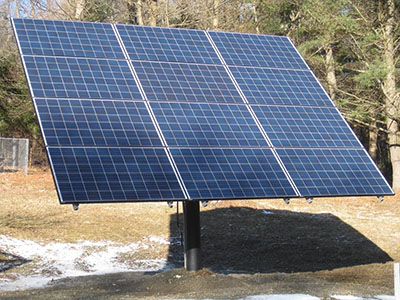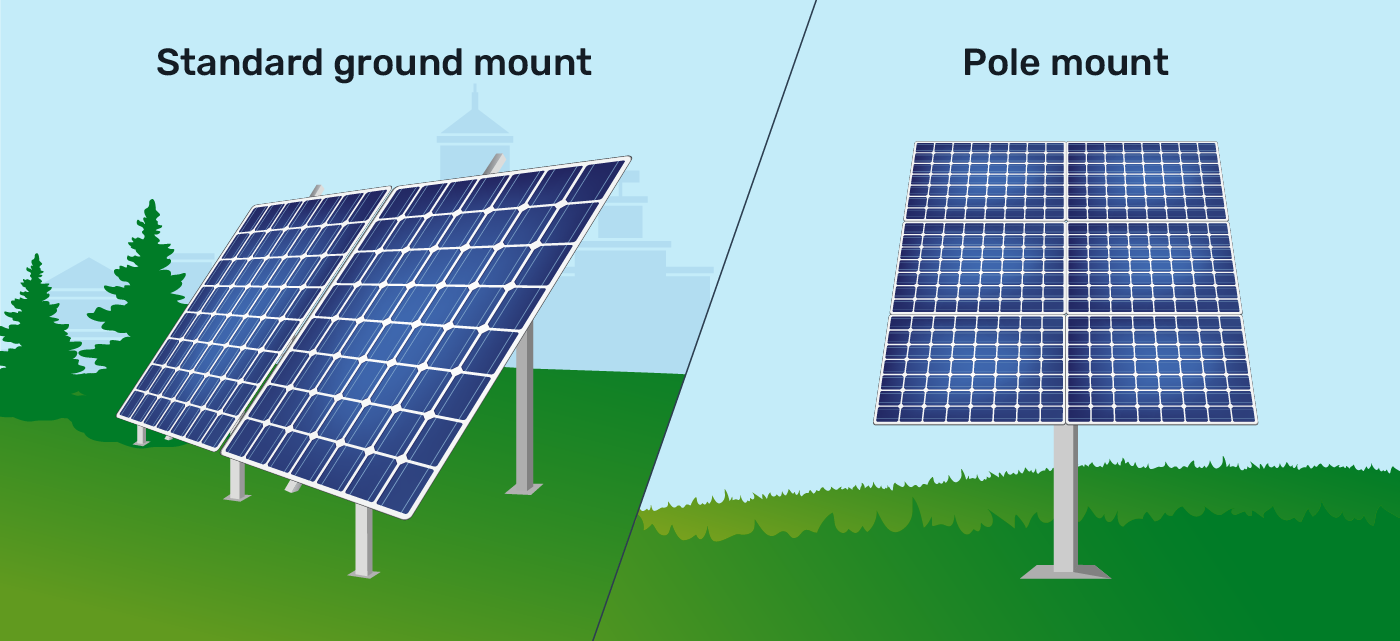Solar Panels Mounted on the Ground – How to Install Ground Mounted Solar Panels
What is a ground-mounted solar system?
A solar system can be installed on the ground or on a roof. If you choose to install solar panels in your yard, they are known as ground-mounted solar systems.
Ground-mounted solar systems are not anchored into walls; rather, they are placed over open land in your backyard or in your garden. Ground-mounted solar panels do not necessarily protrude above ground level, though most often they do. (There is one case where they do not: pole mounts.)
Types of ground-mount solar panel installation
There are two basic forms of ground-mount solar panel installation: standard configurations (often with rack-mounted racks secured by concrete piers) and pole-mount systems. Ground-mounting your solar panels allow you to create a larger system with greater power output but at a higher cost per watt.

Standard ground mounts system
Standard ground-mounted solar panels installation usually uses solar racks secured by concrete piers. The solar panels are held in place on the solar rack using support brackets. Unlike pole-mounted systems, ground mount solar energy system utilizes a lot of hardware and brackets to keep everything in place, which can significantly increase costs.
Pole-mount solar system
Pole-mount solar system installations do not require the installation of solar racks, and they are therefore much less expensive than standard ground mount solar systems. Instead, solar panels are attached to a single pole and pointed directly towards the sun (usually with solar trackers) for maximum effectiveness.
Things to consider before installing ground mounted solar panel
Ground-mounted solar system is simple to install because they can be put on open ground. They don’t need to be drilled into your roof, and the bracings utilized in conventional ground mount systems are light and easy to remove. (If you opt for a pole mount, they’ll usually be installed more securely.)
Key solar panel ground mounts considerations:
- Ground-mounted solar panel systems – like any photovoltaic cells – can still fall over in high winds. (It’s rare, but it does happen!) To minimize the risk of tipping and to keep your solar panels performing at their best, follow these guidelines.
- Solar panels that are mounted on the ground works well on average ground that slopes up away from the house or other buildings. However, if you have very low ground neighboring your home or building and want solar panels that face south, consider flush mounting them instead. Your local solar installer will let you know if this is an option for your roof/building/land.
- Make sure the ground surface in the solar panel mounting location doesn’t have too much debris, vegetation, or anything in it that will interfere with your solar panels’ ability to absorb solar energy.
- If you don’t want solar panels on the ground near your home/building because of concerns about aesthetics, dogs, wildlife, and so on, talk with your solar installer. It’s possible they can install them behind fencing or another type of barriers to minimize their appearance or keep pets and wildlife away.
- Ground-mounted solar panels typically come in standard sizes that can be customized to fit your solar project’s specific location. The solar installer will help you decide the solar panel dimensions that best suit your solar project. They should also provide you with all of the relevant ground mount solar hardware to make installation really simple and straightforward.
Pros and cons of ground-mounted solar panels

Ground-mounted solar panel systems come with a number of advantages, as well as their fair share of disadvantages. Let’s take a look at each of them:
- Effectively all solar panel types can be used by ground-mounted solar panel systems.
- Ground mount solar panel kits use lightweight materials for their bracings, which are usually easy to remove.
- Ground-mounted solar panel kits can be installed in a matter of hours or even less.
- There’s also no storage issues with solar ground-mounted kit suppliers – they can simply pile up the panels during the night and pick them back up again in the morning when sunlight strikes them once more.
- Because ground-mounted solar panel kits don’t require roof penetrations, solar power systems will never look out of place on top of a garage or a shed.
Cons of solar ground-mounted panels
- Ground-mounted solar panel systems are more susceptible to shading from trees and other plants.
- Ground-mounted solar panels require at least one meter of space between them and any obstacles on the ground. This can often prove difficult with certain types of buildings or landscaping features.
- All solar panel types need some degree of the airflow underneath them to keep their internal components cool enough for optimal performance levels.
- Excess solar panels can’t be easily stored in a ground-mounted solar panel system, so you’ll need to plan ahead and make room for them during installation.
- Ground-mounted solar systems are not well suited to portable or seasonal homes.
FAQs about ground mount solar systems
Does mounting solar panels on the ground better than rooftop solar panels?

There is no one-size-fits-all answer to this question, as the best solar panel setup for your home will depend on a variety of factors, including your location, the size, and shape of your roof, and how much sunlight your property receives.
How far from a house can ground mounted solar panels work?
Aside from solar panels on your roof, you can also install ground-mounted solar PV panel systems within the perimeter of your property.
What are tilt and azimuth angles? Do I have to be concerned about them for a home solar system?
The solar panel’s tilt angle is a measure of how much it has been raised from the horizontal position. A solar system’s azimuth angle measures its orientation in relation to the south. The solar industry does not recommend any specific solar angles for solar panels, as there are various factors that impact the optimal solar angles for each area, including latitude and longitude.
Should you install ground-mounted solar panel?
This solar panel system is easy to install. Consider ground-mounted solar panels if you own property that doesn’t have any obstructions, like trees or power lines, in the way of your solar system’s solar panels. The majority of solar companies offer ground mount solar systems.
